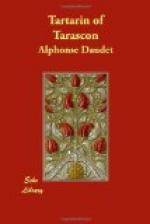All this swarm squeezed and jostled before our good Tartarin’s door, who was going to slaughter lions in the land of the Turks.
For Tarascon, Algeria, Africa, Greece, Persia, Turkey, and Mesopotamia, all form one great hazy country, almost a myth, called the land of the Turks. They say “Tur’s,” but that’s a linguistic digression.
In the midst of all this throng, the cap-poppers bustled to and fro, proud of their captain’s triumph, leaving glorious wakes where they had passed.
In front of the Indian fig-tree house were two large trucks. From time to time the door would open, and allow several persons to be spied, gravely lounging about the little garden. At every new box the throng started and trembled. The articles were named in a loud voice:
“That there’s the shelter-tent; these the potted meats; that’s the physic-chest; these the gun-cases,” — the cap-poppers giving explanations.
All of a sudden, about ten o’clock, there was a great stir in the multitude, for the garden gate banged open.
“Here he is! here he is!” they shouted.
It was he indeed. When he appeared upon the threshold, two outcries of stupefaction burst from the assemblage:
“He’s a Turk!” “He’s got on spectacles!”
In truth, Tartarin of Tarascon had deemed it his duty, on going to Algeria, to don the Algerian costume. Full white linen trousers, small tight vest with metal buttons, a red sash two feet wide around the waist, the neck bare and the forehead shaven, and a vast red fez, or chechia, on his head, with something like a long blue tassel thereto. Together with this, two heavy guns, one on each shoulder, a broad hunting-knife in the girdle, a bandolier across the breast, a revolver on the hip, swinging in its patent leather case — that is all. No, I cry your pardon, I was forgetting the spectacles — a pantomimically large pair of azure barnacles, which came in partly to temper what was rather too fierce in the bearing of our hero.
“Long life to Tartarin! hip, hip, hurrah for Tartarin!” roared the populace.
The great man smiled, but did not salute, on account of the firearms hindering him. Moreover, he knew now on what popular favour depends; it may even be that in the depths of his soul he cursed his terrible fellow-townsfolk, who obliged him to go away and leave his pretty little pleasure-house with whitened walls and green venetians. But there was no show of this.
Calm and proud, although a little pallid, he stepped out on the footway, glanced at the hand-carts, and, seeing all was right, lustily took the road to the railway-station, without even once looking back towards Baobab Villa. Behind him marched the brave Commandant Bravida, Ladevese the Chief Judge, Costecalde the gunsmith next, and then all the sportsmen who pop at caps, preceding the hand-carts and the rag, tag, and bobtail.
Before the station the station-master awaited them, an old African veteran of 1830, who shook Tartarin’s hand many times with fervency.




